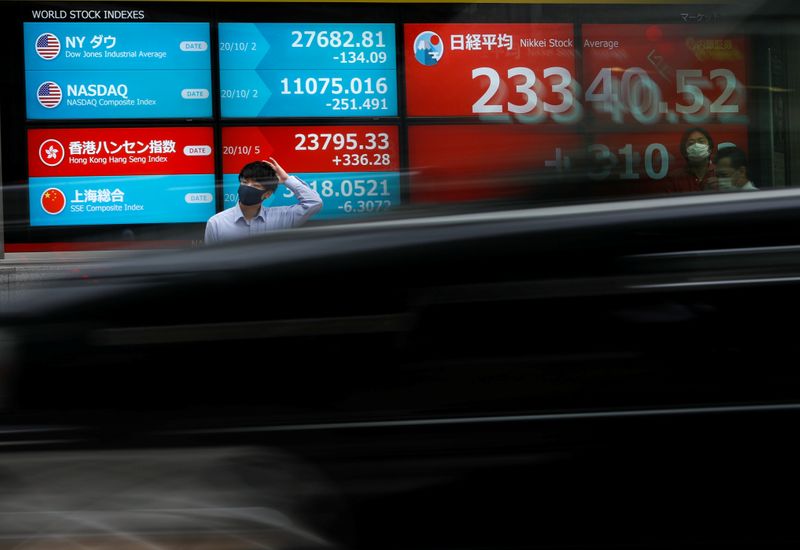By Marc Jones
LONDON (Reuters) - Stock markets and commodities continued to push higher on Tuesday, after the euphoria of a coronavirus vaccine had sent global equity indexes soaring to an all-time high and halted the bond rally.
Having surged 4% on Monday on the vaccine breakthrough from U.S. and German drugmakers Pfizer (NYSE:PFE) and BioNTech there was a drop in the pace in Europe, though things were still shuffling forward. (EU)
The pan-European STOXX 600 was up another 0.4%, taking November's rally past 13% and though Wall Street looked set for a slow start, there was a further 2.7% rally in European banks as worries about mass loan defaults and even more negative interest rates continued to ease. (EU)
"We have some consolidation in markets but I don't think it's surprising given the size of the moves yesterday," said JP Morgan Asset Management's Hugh Gimber.
"The news we had was clearly a big step forward... it's a big piece of the jigsaw to getting the global economy back on its feet."
Asian markets had been playing catch-up overnight, having been closed when Monday's news of the vaccine broke, although like Wall Street overnight, they lost momentum by the end of the session.
Particularly encouraging was that the vaccine's trials had shown it to be more than 90% effective in preventing infection, much higher than expected.
Japan's Nikkei 225 ended up nearly 0.3% after being 1.1% higher in early trading which set a new 29-year high.
Australia's S&P/ASX 200 closed 0.7% higher after trading up as much as 1.6%, Hong Kong's Hang Seng ended up 1.1% and Singapore, the Philippines and Thailand gained 5.2%, 4.1% and 3.4% respectively.
World airline stocks, which have been among the hardest hit by the pandemic, soared over 8%.
There was weakness in China, though, with the CSI300 Index slipping 0.6%. [.SS]
Analysts attributed the decline to the heavy exposure of China's indices to tech stocks, which came under pressure as investors bet on less consumer reliance on technology if a vaccine leads to an easing of movement restrictions.
U.S. tech had suffered on Monday too, Deutsche Bank (DE:DBKGn)'s Jim Reid pointed out. The Nasdaq dropped 1.5%, COVID-19's video chat poster child Zoom fell 17% and sit-on-your-sofa winner Netflix (NASDAQ:NFLX) slumped 8.6%. (N) The Nasdaq was also set to open lower again later.
"It was like a big piece of elastic," JPMorgan (NYSE:JPM)'s Gimber said about moves of COVID-19 winners and losers. "The further you stretch it the sharper it reverts, and the news of the vaccine was the catalyst for that reversion yesterday."
Graphic: Stocks hit new highs - https://fingfx.thomsonreuters.com/gfx/mkt/rlgpdamrkvo/Pasted%20image%201605012511972.png
GAME CHANGER
The vaccine optimism was shared across all major asset classes. Oil prices were edging higher again in London trading after posting the biggest one-day percentage gain in five months on Monday.
The overnight rise had prompted some traders to take profit. In contrast to Pfizer and BioNTech's news, Brazil's health regulator suspended trials for China's Sinovac vaccine after adverse side effects had emerged.
While stocks have also rallied on the assumption that Democrat Joe Biden would be the next U.S. president, the top Republican in U.S. Congress on Monday did not acknowledge Biden as president-elect, raising concerns about a rough transition of power.
"No surprises but it's essentially a rotation ... what was bought in the last eight months is now being sold and what was sold is being bought," Citigroup (NYSE:C) global markets director Elizabeth Tian said.
Early on Tuesday, Japan's Prime Minister Yoshihide Suga had instructed his cabinet to design a fresh stimulus package as well..
In the currency markets, the yen strengthened as much 0.4% to 104.96 per dollar, while sterling was last trading at $1.3230, up 0.5% on the day.
The risk-sensitive Australian dollar edged up 0.1% versus the greenback at $0.7279, while Turkey's lira gave back nearly 2% of the 5.7% surge it saw on Monday after the country's top economic chiefs were replaced.
The vaccine news had also sent long-dated U.S. Treasury yields skyrocketing on Monday in their biggest one-day jump since March. The yield curve, an indication of risk appetite, hit its steepest level since March.
Bonds had their biggest selloff since recoiling from March peaks. The yield on benchmark 10-year U.S. government debt, which rises when prices fall, jumped 10.3 basis points on Monday and held above 0.9% on Tuesday at 0.9099%.
In Europe, German Bund yields were near their highest in a month too, [GVD/EUR] and Brent oil futures rose 9 cents, or 0.2%, to $42.49 after their 8% vault the previous session. [O/R]
"OPEC+ will now feel confident that a solution is actually on the horizon which will cure the oil markets current demand problem. It is not a pie in the sky, it is real and the solution is on its way," said Bjarne Schieldrop, chief commodities analyst at SEB.
